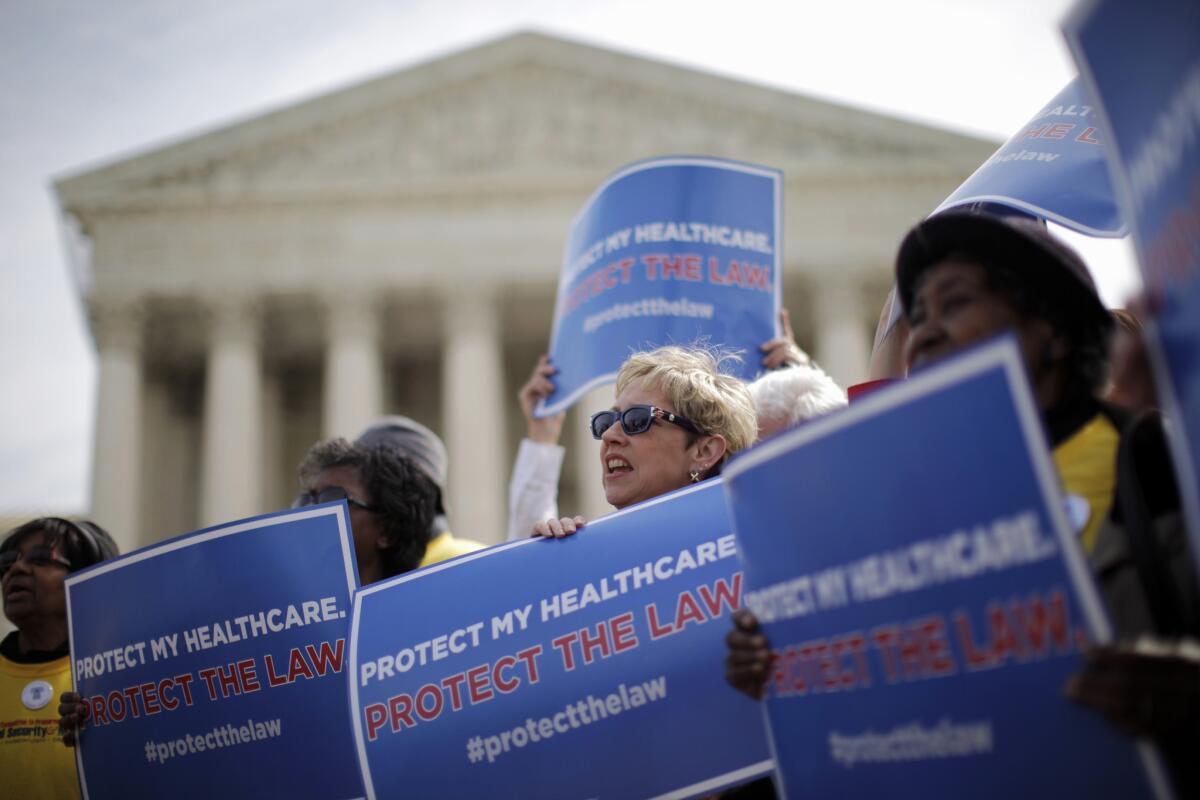Editorial: Healthcare chaos looms if Supreme Court rules against Obamacare subsidies

Supporters of healthcare reform rally in front of the Supreme Court in Washington on March 12, 2012. The justices are expected to decide this month on the fate of insurance subsidies for millions of people who live in states with federally run exchanges.
By the end of this month, the Supreme Court is expected to decide whether to throw out a crucial piece of the 2010 healthcare law: the insurance subsidies for lower-income Americans in the 34 states that have insurance-buying marketplaces operated by the federal government. The prospect that the subsidies might be eliminated has some Obamacare critics in the GOP tingling in anticipation, but others are rightly worried about the potential for health insurance chaos and harm to their constituents. The problem for the latter is coming up with a plan that wouldn’t leave people worse off than they were before Obamacare.
The lawsuit, King vs. Burwell, is one of several filed by opponents of the 2010 law that challenge how the Obama administration interpreted one line buried in the 955-page statute. The plaintiffs argue that the plain language of the provision limits subsidies to the states that established their own exchanges, as California and 15 others have done. Although one federal appeals court agreed, the one hearing King’s case said such an interpretation makes no sense in the context of a law designed to make health coverage available to all Americans.
The second is the right reading, but the Supreme Court has the final say. And if the justices agree with King, more than 9 million people will lose their subsidies the moment their decision goes into effect.
That would be a terrible result, forcing many lower-income Americans to go back to emergency rooms for the care they urgently need but can’t pay for. Those costs would ultimately get passed on to everyone who has insurance. Meanwhile, the loss of subsidies would drive many younger and healthier people out of the individual market, causing premiums to shoot up 35%, one study estimates. Several polls in recent months have shown that most people do not want the subsidies to evaporate, even if they have other complaints about Obamacare.
The simplest fix would be for Congress to change the disputed provision to clarify that subsidies are available in every state, but that’s not going to happen: Republican members of Congress aren’t willing to do anything that extends the life of Obamacare. The same problem is likely to prevent legislators in many of the 36 affected states from setting up their own exchanges.
To avert the looming crisis, several Republicans in Congress have floated plans that would either act as stopgap measures or permanent replacements for the 2010 law. In addition to continuing the subsidies for some of those eligible today, all of these proposals would preserve some of the most popular insurance reforms of the 2010 law, particularly the ban on denying coverage to people with preexisting conditions, while repealing the least popular requirements. The problem in each case is that they would leave too many people uninsured while also creating new problems for everyone else.
The most prominent of these proposals is a bill by Sen. Ron Johnson (R-Wis.) that is cosponsored by more than half of his Republican colleagues, including Majority Leader Mitch McConnell (R-Ky.). Johnson describes the bill, S 1016, as a bridge between Obamacare and a new approach to healthcare reform that Republicans would try to enact after President Obama leaves office. It would allow subsidies to continue in states using federally operated exchanges until September 2017, but it would deny them to anyone in those states who doesn’t already have a subsidized policy. That would freeze out the surprisingly large number of lower-income people who move in and out of eligibility as their incomes fluctuate. To help those consumers, the bill would allow states to approve less comprehensive insurance plans than the 2010 law allows. Cheap policies with limited coverage, however, won’t be much help to anyone who doesn’t stay healthy and injury-free.
Johnson’s bill would continue requiring insurers to cover everyone regardless of preexisting conditions while eliminating the requirement that individuals and businesses obtain coverage. Ending the individual and employer mandates may be shrewd politically in a GOP-controlled Congress, but it would create an unsustainable insurance system. With no penalty for not carrying insurance, the bill would encourage people to drop their policies until they became sick, leaving insurers to cover only those people who needed treatment. Over time, premiums would skyrocket as a growing number of younger and healthier people cut their costs by going uninsured.
Some other GOP proposals that are intended to be longer-term fixes strike a better balance between making it easier for those who need care to get coverage and persuading younger, healthier people sign up. But they would still leave more people without insurance — and allow insurers to resume the odious practice of cherry-picking customers by withholding coverage for costly conditions. And the subsidies are so low, they’d force low- and moderate-income consumers to carry less coverage and pay more out of pocket.
There is an eat-your-vegetables aspect to fixing the healthcare system that Republicans don’t acknowledge. In order to make the changes that everyone wants, such as stopping insurers from shunning people with preexisting conditions, Congress also has to do things that are politically difficult. That includes creating penalties that discourage people from enrolling in a plan only after they need treatment. Similarly, holding down healthcare costs is hardly a pain-free exercise, given that it raises difficult questions about how medicine is practiced and how the risk and cost of illness and injury are spread.
Plans such as Johnson’s will be moot if the Supreme Court rules against the King lawsuit, as it should. Otherwise, Republicans will be forced to come up with a Plan B, and what they’ve offered so far isn’t good enough.
Follow the Opinion section on Twitter @latimesopinion and Facebook
More to Read
Sign up for Essential California
The most important California stories and recommendations in your inbox every morning.
You may occasionally receive promotional content from the Los Angeles Times.










